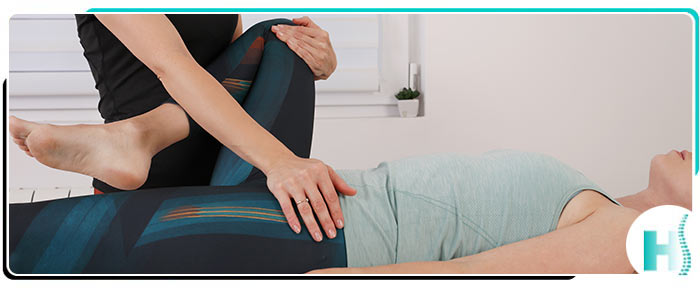Pelvic Floor Therapy in Hoboken, NJ
Pelvic floor physical therapy is a procedure that can help with pelvic floor muscle pain, weakness, and dysfunction. It can help strengthen and elevate your pelvic muscles, giving your bladder and ureters more support. You may require pelvic floor therapy If you get pain during urination when your bladder is full or if you experience pee leaks while coughing, sneezing, or laughing, at Hudson Sport & Spine, our team of licensed specialists provides high-level pelvic floor therapy to help you strengthen and control your muscles better. For more information, contact us or schedule an appointment online. We are conveniently located at 70 Hudson St Suite 2B, Hoboken, NJ 07030.


Table of Contents:
What do you do at pelvic floor therapy?
What are the signs of a weak pelvic floor?
How do I know if I need pelvic floor therapy?
How long does it take to strengthen the pelvic floor?
Your pelvic floor muscles are primarily responsible for controlling bowel and bladder functions. When these muscles weaken, it can make it difficult to control your urine, excrement, and gas, which is often an uncomfortable and embarrassing experience for many.
Pelvic floor therapy allows you to restore mobility, movement, and healthy function to your pelvic floor muscles. This is done through a variety of non-surgical and painless approaches that target the muscle groups that are responsible for controlling bladder, bowel, and sexual function.
In cases where pain is present, your therapist will perform testing and assessments to identify muscle trigger points that are causing the issues. Following this, your pelvic floor therapist will teach you the appropriate movements and exercises to better your muscle strength and control. This may include postural exercises, relaxation techniques, toning and tightening maneuvers, and diaphragmatic breathing. This will improve functionality while also reducing any pain and/or discomfort in the targeted areas.
Pelvic floor therapy focuses on teaching patients the appropriate way to stabilize, strengthen, and retrain their core and major muscle groups.
There are many signs and symptoms associated with a weak pelvic floor, the severity of which may vary from person to person. If you’re experiencing any of the following symptoms, it may indicate that you have weakness in your pelvic floor:
– Frequently needing to use the bathroom.
– Straining during a bowel movement.
– Constipation.
– Leaking stool or urine.
– Frequent urination.
– Painful urination.
– Lower back pain.
– Consistent pain in your pelvis, genitals, and/or rectum.
– Groin pain.
– Problems with ejaculation.
– Erectile dysfunction.
– Compromised reproductive system.
– Pain during sexual intercourse.
If you’re experiencing one or more of these pelvic floor dysfunction symptoms, book in to see your primary healthcare provider or a specialist at your earliest convenience. They will custom design a treatment plan to fit your unique health needs, reducing symptoms and/or alleviating them completely.
Pelvic floor pain can affect both men and women, causing pain and discomfort that can negatively affect your quality of life. You may need pelvic floor therapy if you experience one or more of these symptoms on a regular basis:
– Constipation.
– Feeling the need to urinate but being unable to.
– Lower abdominal and/or back pain.
– Pain during or after sex.
– Pain during urination.
– Pain during vaginal exams.
– Pain when your bladder is full.
– Painful bowel movements.
– Prolapse.
– Straining during bowel movements.
– Urine leakage.
Women in particular are prone to needing pelvic floor therapy, especially those who have recently given birth. This type of therapy has been shown to be very beneficial for women who are experiencing pregnancy discomfort, a health decline after childbirth, or complications from a C-section.
Pelvic floor therapy won’t fix the issues overnight, but it’s extremely effective when done properly and consistently. Your pelvic floor muscles will take time to repair, but this can be done by adhering to the plan and exercises laid out by your pelvic floor specialist.
On average, patients typically experience improvements in their symptoms within 4 to 6 weeks of following their program. These results will continue to improve over the following months as the muscle groups get stronger, resulting in more comfort, less pain, and fewer (or eliminated) incontinence issues.
At Hudson Sport & Spine, Dr. Todd Givens, DC, provides targeted pelvic floor therapy to help patients address issues like chronic pelvic pain, incontinence, postpartum recovery, and core instability. He understands that pelvic floor dysfunction can be frustrating and often goes untreated for too long. That’s why he takes a personalized, respectful approach, starting with a detailed assessment to understand your symptoms and underlying issues. At Hudson Sport & Spine, therapy may include manual techniques, guided exercises, posture correction, and neuromuscular re-education to restore strength and coordination in the pelvic region.
Dr. Givens works closely with each patient to ensure progress is steady and comfortable. Whether you’re recovering from childbirth, surgery, or dealing with long-term discomfort, Hudson Sport & Spine offers expert care in a supportive environment. The goal is real improvement—not just symptom relief, but lasting confidence in your body’s performance. If you need pelvic floor therapy, our team of specialists at Hudson Sport & Spine would love to help. For more information about our pelvic recovery services or our practitioners, contact us today. Or, if you’re ready to commit to an appointment, you can book in online at your earliest convenience. We serve patients from Hoboken NJ, Jersey City NJ, Weehawken NJ, West New York NJ, Guttenberg NJ, Secaucus NJ, Harrison NJ, Kearny NJ, Newark NJ, Belleville NJ, North Bergen NJ and Lyndhurst NJ.
Check Out Our 5 Star Reviews









